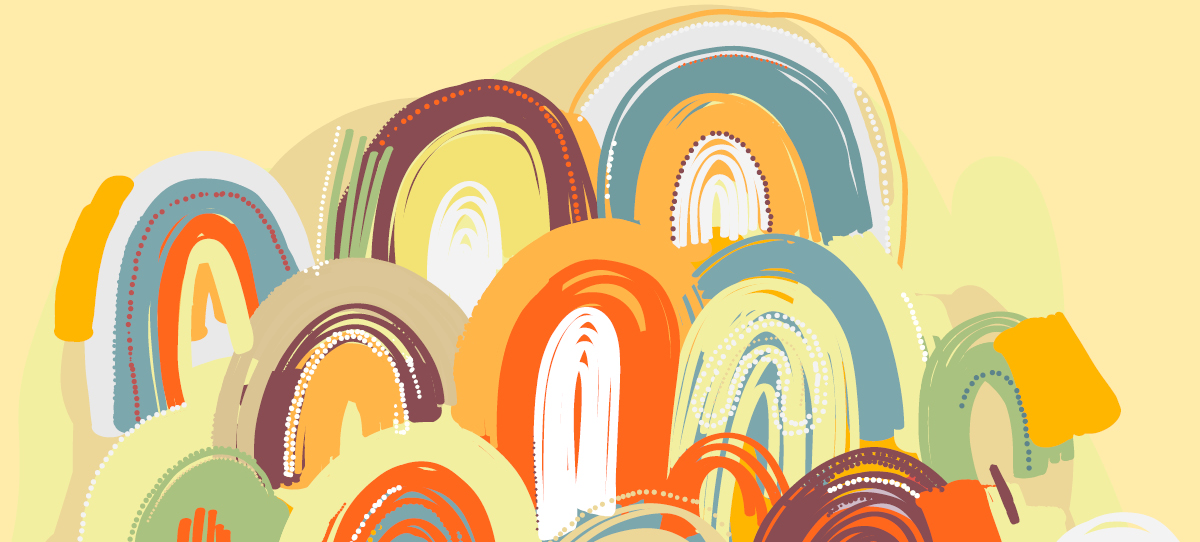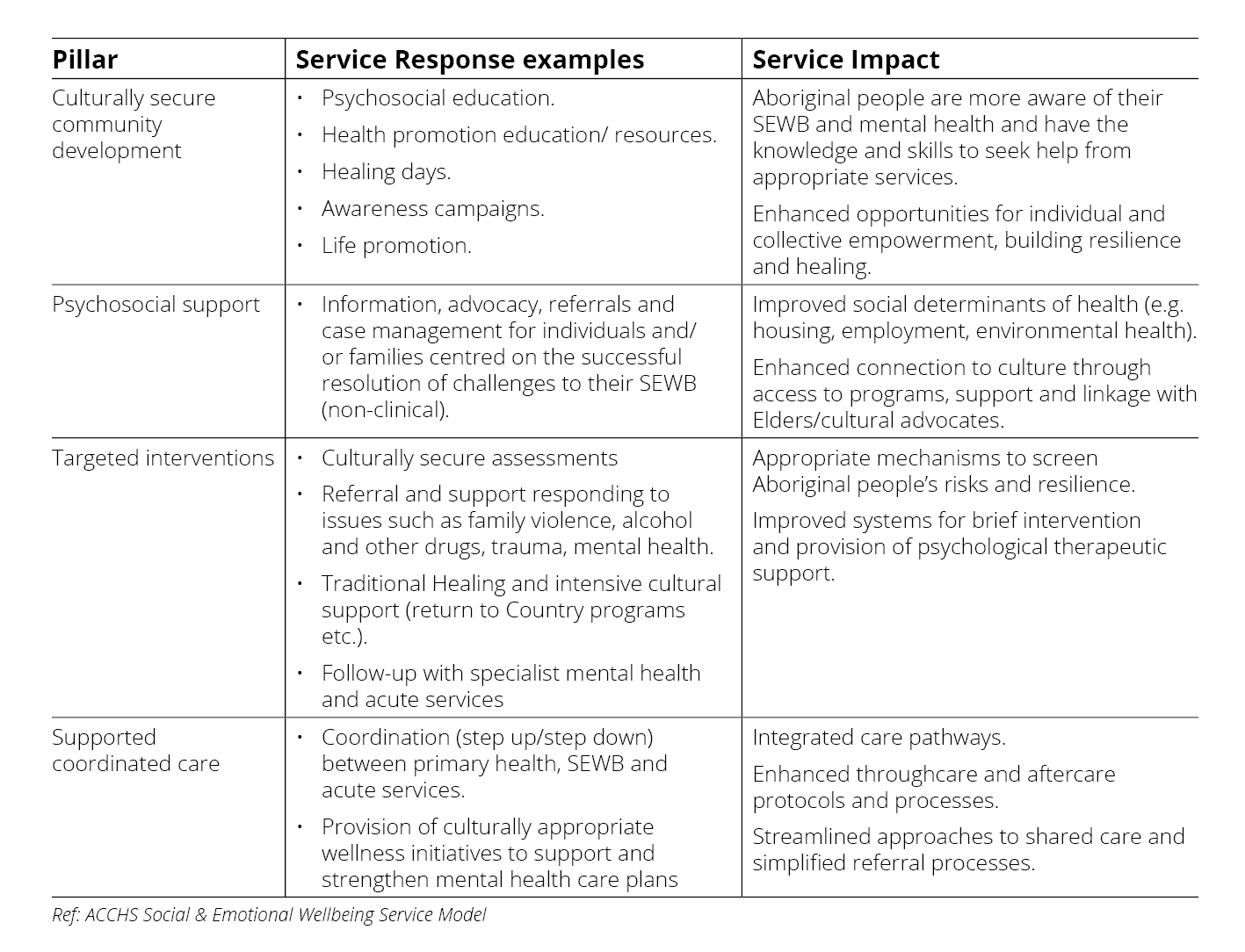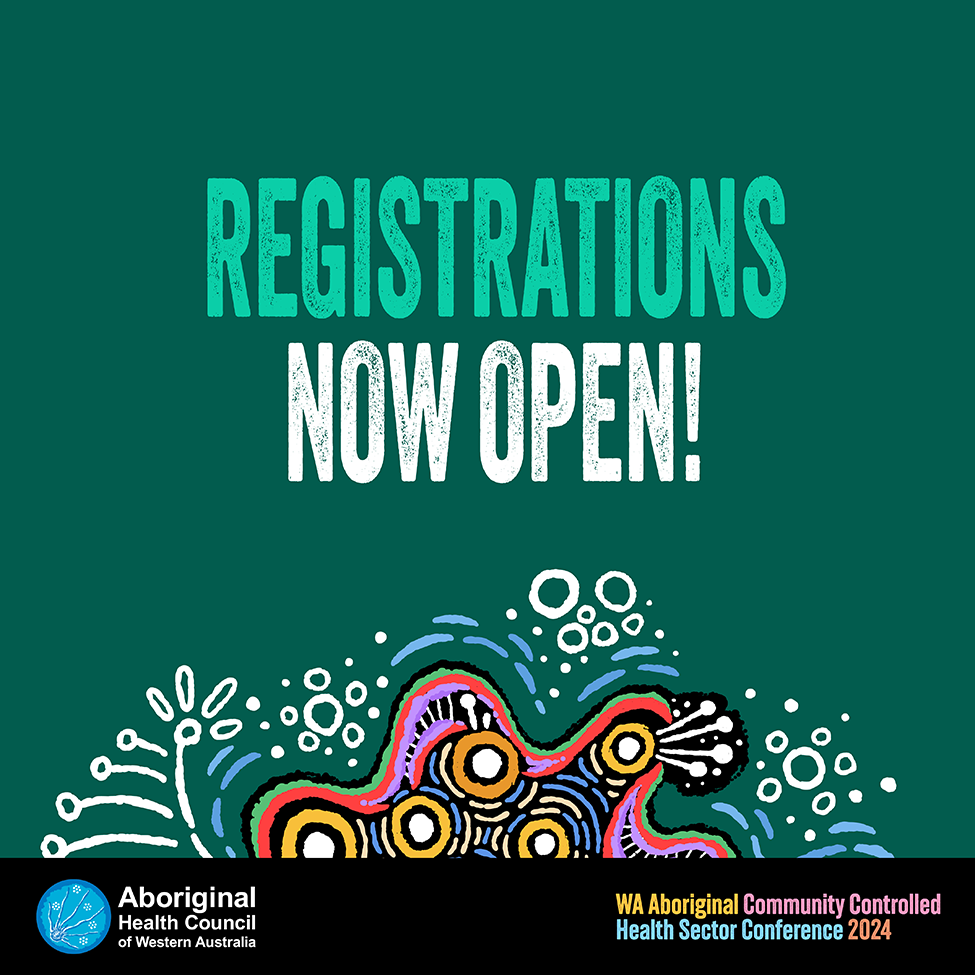Social and Emotional Wellbeing Program
SEWB Service Model
The Service Model is a holistic suite of services and activities that include: awareness raising and community development; social support; casework and advocacy; psychosocial support; counselling and culturally appropriate therapeutic support; and psychological and psychiatric interventions, treatment and support. This work is governed and delivered by ACCHS.
A four pillar approach to SEWB helps define a sector wide approach but is flexible in allowing individual ACCHS to determine what services or activities are needed for their community.
ACCHS SEWB Service Model Worker Guide
The AHCWA SEWB team are currently working on developing a SEWB Service Model Worker Guide in consultation with the Pilot sites. This will be included in an induction/ orientation pack for new SEWB staff working within the Service Model. The guide will embed the four pillar approach and the service response undertaken by the teams.
Useful Websites:
TIMHWB
13 YARN
Reach Out Australia
Family, Domestic and Sexual Violence Program
Going from strength to strength – Continuing to grow the capacity of FDSV programs within our sector
As of the end of February, there are now 16.5 FDSV staff employed across the 6 pilot sites and approximately 50% of this workforce are Aboriginal. Between December 2023 and February 2024, the pilot sites provided FDSV services for 333 clients/families and there were more than 1467 episodes of service delivered across the programs.
The FDSV workforce from the 6 sites, together with AHCWA staff and the evaluation team from ECU continue to gather for Community of Practice meetings once per month to explore ongoing approaches to strengthening capacity for this vital program area. We continue to consider core skills, practices and resources that support the workforce to assess and manage risk; support safety for themselves and their communities; and to link with pathways for the prevention of violence and healing for today’s families and future generations.
AHCWA FDSV Project Advisor
In late January, AHCWA welcomed Sarah Haythornthwaite in the role of FDSV Project Advisor. Sarah grew up on the lands of the Ballardong and then Whadjuk people of the Noongar Nation, where her family (who are originally from England and Ireland) have been living for several generations. Following living and working in the NT over the last 15 years, Sarah is glad to be back here on Noongar Boodja working for AHCWA. Sarah is a registered Clinical Psychologist who has worked in a variety of settings over the last 25 years, including working within and alongside community controlled SEWB and other family support programs. Sarah has worked closely with people and communities impacted by trauma and violence, and understands these issues in the context of our violent colonial history and ongoing experiences of colonisation. In discussing her new role, Sarah stated, ‘I believe that funding that supports community leadership within SEWB and FDSV programs represents an important and hopeful step in supporting communities to strengthen the connections that have been maintaining SEWB, preventing harm and supported healing for thousands of years. I am looking forward to supporting the growth of these important FDSV programs within our services.’
Ochre Ribbon Week 12th – 19th February, ‘Don’t Silence the Violence’
12th to 19th February was Ochre Ribbon Week, an Aboriginal-led advocacy campaign which aims to raise awareness about the devastating impacts of family violence on Aboriginal and Torres Strait Islander communities. The Ochre Ribbon Campaign highlights the need to stop this violence and works to strengthen advances in prevention initiatives from other agencies and campaigns.
It was wonderful to see the various ways the FDSV teams across the state organised and joined with various Ochre Ribbon community events.
The AHCWA FDSV Team held a morning tea with staff on the 15th Feb.
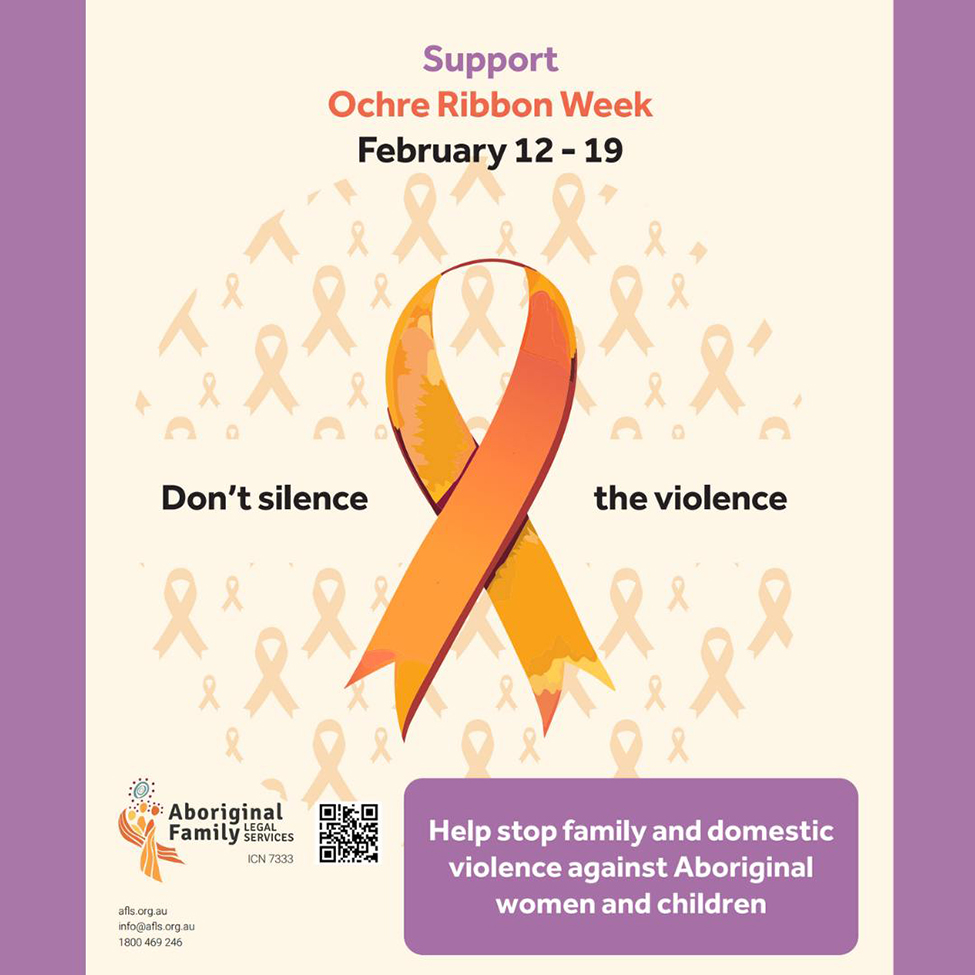
If you or someone you know is experiencing family violence it is important to seek help as soon as possible.
For 24/7 support please contact:
13YARN (for Aboriginal and Torres Strait Islander people)
13 92 76
www.13yarn.org.au
1800 RESPECT
1800 737 732
1800respect.org.au
For legal assistance, call
Aboriginal Legal Service of WA – 1800 019 900
Legal Aid WA, Legal Yarn – 1800 319 803
Aboriginal Family Legal Service – 9355 1502
Community Legal WA – www.communitylegalwa.org.au/contact-us
Culture Care Connect Program
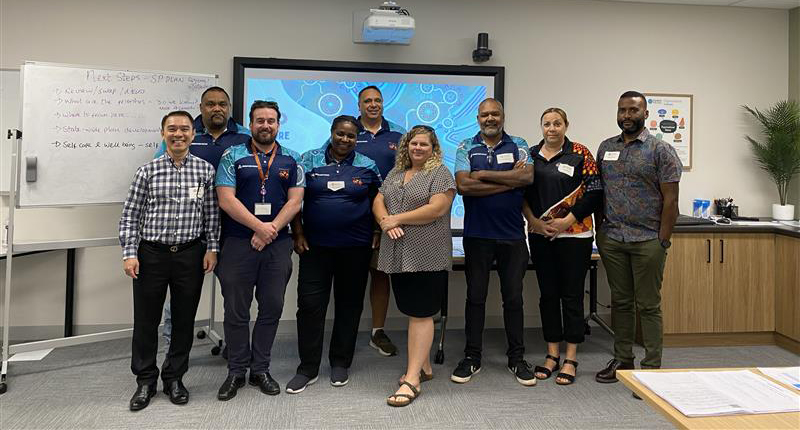
The CCC teams from Kimberley Aboriginal Medical Services, Pilbara Aboriginal Health Alliance, Moorditj Koort, Derbarl Yerrigan Health Service, and Bega Garnbirringu Health Service convened in Perth from March 12th to March 15th, 2024, marking the inaugural WA CCC Gathering hosted at the AHCWA offices.
On the first day, the CCC Network Coordinators met to explore ways in which the regions could contribute to the development of the WA Jurisdictional Suicide Prevention Plan. Emphasising the significance of consultation and co-design led by local leaders, following cultural protocols and planning processes, the team conducted a preliminary desktop review of existing WA State and Regional Suicide Prevention Plans. Additionally, the CCC NACCHO team presented a video session supporting the development of the WA Jurisdictional Suicide Prevention Plan.
Day two commenced with each CCC site sharing insights into developing their respective models of care, exchanging knowledge, highlighting successes, and addressing challenges.
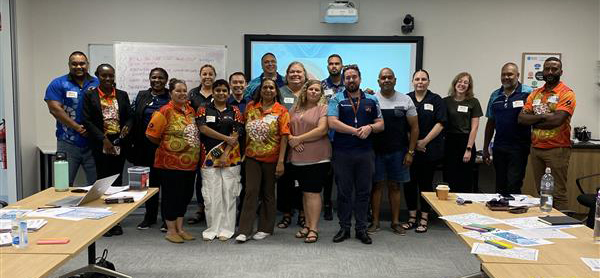
The Mental Health Commission Community Liaison Officers (CLO) Program engaged with the CCC Network Coordinators and Aftercare Workers to explore potential areas of collaboration and exchange ideas. Puntukurnu Aboriginal Medical Service and Pilbara Aboriginal Health Alliance delivered a presentation titled “Collaboration for Effective Suicide Prevention” focusing on the Pilbara Region. The presentation shed light on the Pilbara Suicide Peer Network and emphasised the collaborative efforts of all stakeholders in suicide prevention within the region.
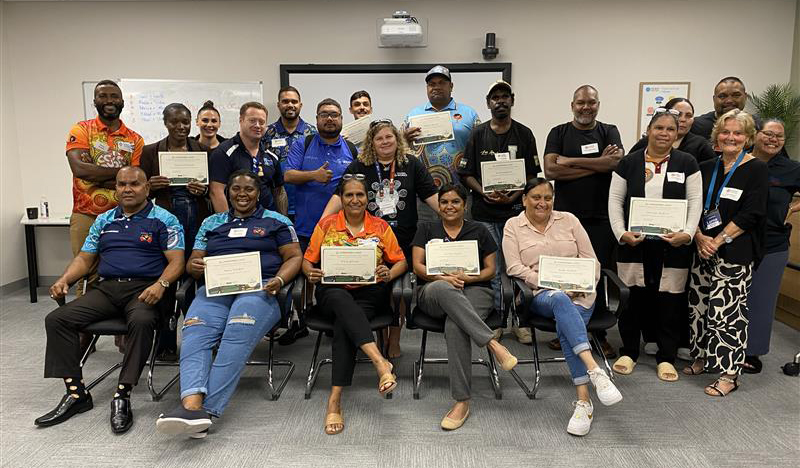
On days two and three, the CLO and CCC teams were joined by SEWB and FDV teams from South West Aboriginal Medical Service and Yura Yungi Aboriginal Medical Service for Indigenous Applied Suicide Intervention Skills Training (I-ASIST).
During the two-day I-ASIST sessions, the culturally relevant framework enabled participants to learn to utilise a unique 6-task model for suicide first-aid intervention, collaborate with individuals to develop personalised safety plans, and connect them with further support. These skills are crucial for fostering a suicide-safer community across the state.
Special recognition goes to Kesi-Maree Prior at PAHA and Mark Bateman at Moorditj Koort for their leadership in facilitating and supporting the development of the CCC Gathering. The CCC team has gathered valuable insights and identified key actions to implement in the coming months. PAHA and KAMs will present at the AHCWA State Conference on the CCC rollout in their regions. Express your interest in attending by registering here
AHCWA Training Opportunities
- Birds and the BBVs
- Young Leaders
- Aboriginal Mental Health First Aid
- Immunisation
- Eye Health
For more information please visit our website www.achwa.org or ph: (08) 9227 1631
WA Aboriginal Community Controlled Health Sector Conference 2024
AHCWA hosts an annual West Australian Aboriginal Community Controlled Health Sector Conference each year, aimed at health care professionals working within the 23 Member Services, their Directors and those working more generally in Aboriginal Health throughout Australia.
2024 WA Aboriginal Youth Conference: Monday 29th April 2024
AHCWA Members Forum: Tuesday 30 April 2024
2024 State Sector Conference: Wednesday 1 May & Thursday 2 May, 2024
The event will be held at The Esplanade Hotel, Fremantle

